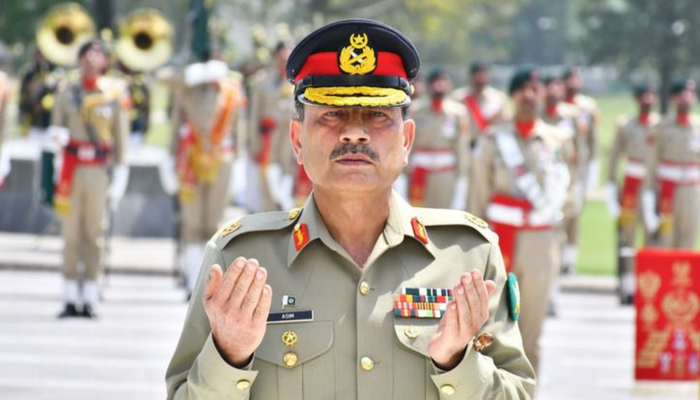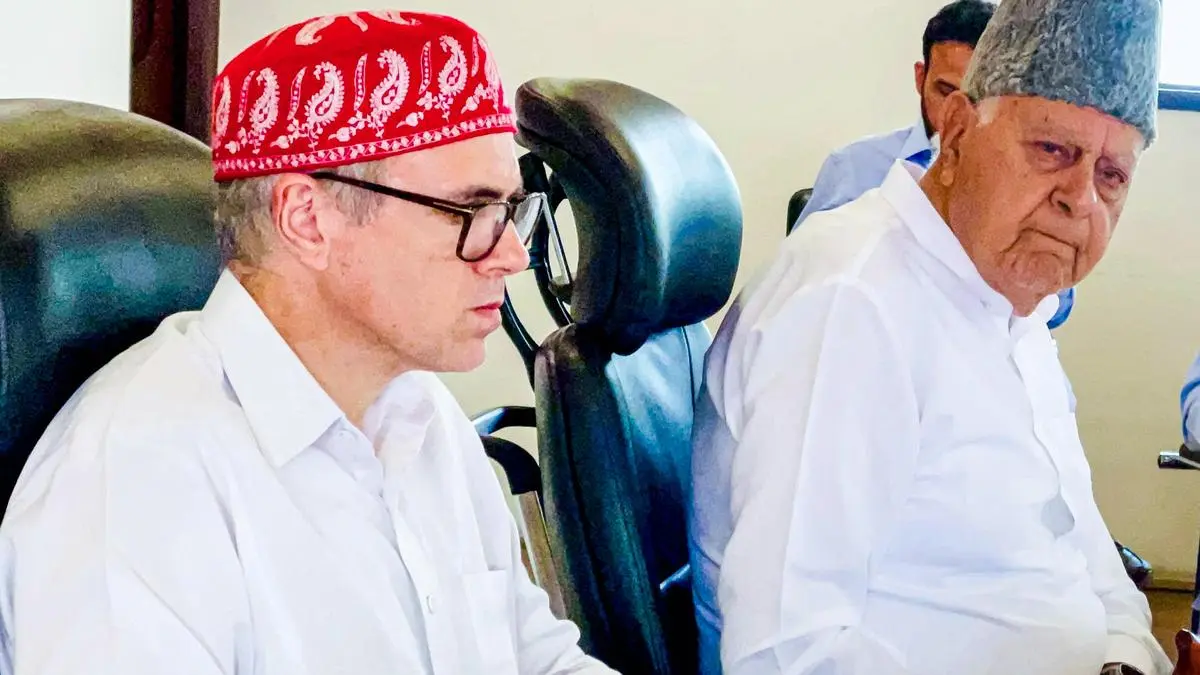Pakistan to amend constitution giving more power to Army Chief, putting him above other 2 chiefs: Read how Military’s hold over Pakistan increases while India remains a vibrant democracy
Pakistan is all set to shed its façade of being a democratic country and embrace its real identity of a military state, with the introduction of a Bill which seeks to introduce some major changes in the country’s Constitutional framework. Pakistan’s federal government presented the draft of the much-anticipated 27th Amendment Bill in the Senate on Saturday (8th November). The bill is designed to re-write Article 243 of Pakistan’s Constitution, which governs the relationship between the prime minister (as head of the federal government) and the president (as the head of state) in relation to the control and command of the armed forces. It is expected to alter the constitutional framework relating to the judiciary, provincial powers and, most importantly, the armed forces, as reported by Dawn. The bill creates the post of Chief of Defence Forces, and gives much broader constitutionally protected powers and privileges to the country’s military leadership. In essence, while it is already known that Pakistan is effectively run by the armed forces, the military leadership gets more power with this amendment. ‘Field Marshal’ Asim Munir to become Pakistan’s Chief of Defence Staff The Bill, which makes a significant overhaul in the armed forces hierarchy, has caused a stir among the opposition parties and civil rights groups, which fear that it would lead to the concentration of power in the hands of the armed forces. One of the notable changes introduced by the Bill is the creation of a new position of ‘Chief of Defence Staff’ and the abolition of the existing position of the Chairman of the Joint Chiefs of Staff Committee (CJCSC). Minister for Law and Justice Azam Nazeer Tarar said, while presenting the draft in the Senate, that the position of the CJCSC will be abolished from November 27, 2025, after the tenure of the existing CJCSC ends. “The present CJCSC is also our hero; it [the position] will be abolished after his appointment ends. Parliament cannot even think of depriving him of the role during his tenure,” Tarar said. Under the Bill, the Chief of the Army Staff will be elevated to the position of the Chief of Defence Staff, an authority which will command all three forces of the Army, Navy and Air Force. The newly created position of the CDS will be held by the serving Chief of Army Staff, Asim Munir. Interestingly, the development comes after Munir was extraordinarily elevated to the position of ‘Field Marshal’ following India’s Operation Sindoor. Munir is the second Field Marshal of Pakistan after Ayub Khan, who promoted himself to the position in 1959. This is the reason that the Bill is being viewed by many as a deliberate move to legitimise Munir’s elevation by granting it a Constitutional backing. Army Chief over Navy and Air Force chiefs While most countries now have unified military command at the top, what makes Pakistan’s amendment unique that they are not creating a new position of Chief of Defence Staff. Instead, the Chief of the Army Staff will concurrently be the Chief of the Defence Forces. There is no provision for chiefs of Air Force or Navy to become the CDS. With the provision that the Army Staff will concurrently be the Chief of the Defence Forces, the Army Chief will rule over Air Force and Navy of Pakistan. In contrast, for India’s CDS position created few years ago, it is a new position different from the three chiefs, and the CDS can come from any of the three armed forces. Position of Commander of the National Strategic Command and appointments of chiefs of armed forces Additionally, the Bill establishes the position of Commander of the National Strategic Command, which will oversee the Islamic country’s nuclear and strategic assets. The appointment to the position will be made by the Prime Minister on the recommendation of the Army Chief, and the person appointed to the position must have served in the Army. The chiefs of the Army, Navy and Air Force will be appointed by the President, acting on the advice of the Prime Minister, and the Army chief will concurrently serve as the CDS. Life-long constitutional protection for the officers with a five-star rank Further enhancing the powers and immunities of the top officials of the armed forces, the amendment will confer lifelong constitutional protection to officers promoted to five-star rank, which implies that such officers would “retain the rank, privileges and remain in uniform for life” and can only be removed through a procedure similar to impeachment. The Field Marshal, Marshal of the Air Force and Admiral of the Fleet are five star positions. “Where the federal government promotes a member of the armed forces to the rank of field marshal, marshal of the air force or admiral of the fleet, such officer shall retain the rank, privileges and remain in uniform for life,” the Minister for Law and Justice stated in the Senate. Besides, such officers will also possess immunities equiv



Pakistan is all set to shed its façade of being a democratic country and embrace its real identity of a military state, with the introduction of a Bill which seeks to introduce some major changes in the country’s Constitutional framework. Pakistan’s federal government presented the draft of the much-anticipated 27th Amendment Bill in the Senate on Saturday (8th November). The bill is designed to re-write Article 243 of Pakistan’s Constitution, which governs the relationship between the prime minister (as head of the federal government) and the president (as the head of state) in relation to the control and command of the armed forces.
It is expected to alter the constitutional framework relating to the judiciary, provincial powers and, most importantly, the armed forces, as reported by Dawn. The bill creates the post of Chief of Defence Forces, and gives much broader constitutionally protected powers and privileges to the country’s military leadership. In essence, while it is already known that Pakistan is effectively run by the armed forces, the military leadership gets more power with this amendment.
‘Field Marshal’ Asim Munir to become Pakistan’s Chief of Defence Staff
The Bill, which makes a significant overhaul in the armed forces hierarchy, has caused a stir among the opposition parties and civil rights groups, which fear that it would lead to the concentration of power in the hands of the armed forces. One of the notable changes introduced by the Bill is the creation of a new position of ‘Chief of Defence Staff’ and the abolition of the existing position of the Chairman of the Joint Chiefs of Staff Committee (CJCSC).
Minister for Law and Justice Azam Nazeer Tarar said, while presenting the draft in the Senate, that the position of the CJCSC will be abolished from November 27, 2025, after the tenure of the existing CJCSC ends. “The present CJCSC is also our hero; it [the position] will be abolished after his appointment ends. Parliament cannot even think of depriving him of the role during his tenure,” Tarar said.
Under the Bill, the Chief of the Army Staff will be elevated to the position of the Chief of Defence Staff, an authority which will command all three forces of the Army, Navy and Air Force. The newly created position of the CDS will be held by the serving Chief of Army Staff, Asim Munir. Interestingly, the development comes after Munir was extraordinarily elevated to the position of ‘Field Marshal’ following India’s Operation Sindoor. Munir is the second Field Marshal of Pakistan after Ayub Khan, who promoted himself to the position in 1959. This is the reason that the Bill is being viewed by many as a deliberate move to legitimise Munir’s elevation by granting it a Constitutional backing.
Army Chief over Navy and Air Force chiefs
While most countries now have unified military command at the top, what makes Pakistan’s amendment unique that they are not creating a new position of Chief of Defence Staff. Instead, the Chief of the Army Staff will concurrently be the Chief of the Defence Forces. There is no provision for chiefs of Air Force or Navy to become the CDS.
With the provision that the Army Staff will concurrently be the Chief of the Defence Forces, the Army Chief will rule over Air Force and Navy of Pakistan.
In contrast, for India’s CDS position created few years ago, it is a new position different from the three chiefs, and the CDS can come from any of the three armed forces.
Position of Commander of the National Strategic Command and appointments of chiefs of armed forces
Additionally, the Bill establishes the position of Commander of the National Strategic Command, which will oversee the Islamic country’s nuclear and strategic assets. The appointment to the position will be made by the Prime Minister on the recommendation of the Army Chief, and the person appointed to the position must have served in the Army. The chiefs of the Army, Navy and Air Force will be appointed by the President, acting on the advice of the Prime Minister, and the Army chief will concurrently serve as the CDS.
Life-long constitutional protection for the officers with a five-star rank
Further enhancing the powers and immunities of the top officials of the armed forces, the amendment will confer lifelong constitutional protection to officers promoted to five-star rank, which implies that such officers would “retain the rank, privileges and remain in uniform for life” and can only be removed through a procedure similar to impeachment. The Field Marshal, Marshal of the Air Force and Admiral of the Fleet are five star positions.
“Where the federal government promotes a member of the armed forces to the rank of field marshal, marshal of the air force or admiral of the fleet, such officer shall retain the rank, privileges and remain in uniform for life,” the Minister for Law and Justice stated in the Senate.
Besides, such officers will also possess immunities equivalent to those enjoyed by the President of Pakistan under Article 248. The post-command duties and remuneration of these officers would be decided by the federal government and the President on the advice of the Prime Minister.
India is a thriving democracy while Pakistan
With the adoption of the amendment, General Asim Munir will be the Chief Army Staff, Chief of Defence Forces, and the country’s senior-most military officer with command over all three branches of the armed forces. Additionally, he gets life-long constitutional protection and immunity.
While the Pakistani government is defending the Bill as a mere technical update in the pretext of modernising command arrangements and regularising the recently made extraordinary promotions, the Bill has sparked a political storm in the country. The opposition parties and the civil rights groups apprehend that the Bill will tilt the balance of power in favour of the armed forces and weaken the ‘democratic’ institutions of the country.
The Bill highlights a sharp contrast between India and Pakistan. While India continues to be a thriving democracy, upholding constitutional values and vision, Pakistan, on the other hand, is gradually yet steadily marching towards becoming a military state. It is no secret that the Pakistani government has always acted as a puppet of its Army, but the proposed legislation will entirely drop the Islamic country’s pretence of a democracy.





































































